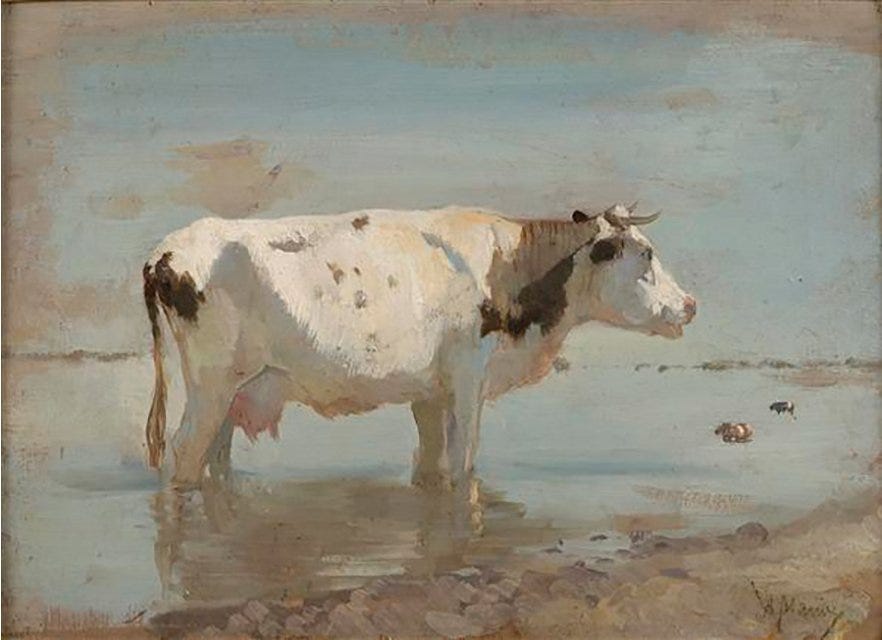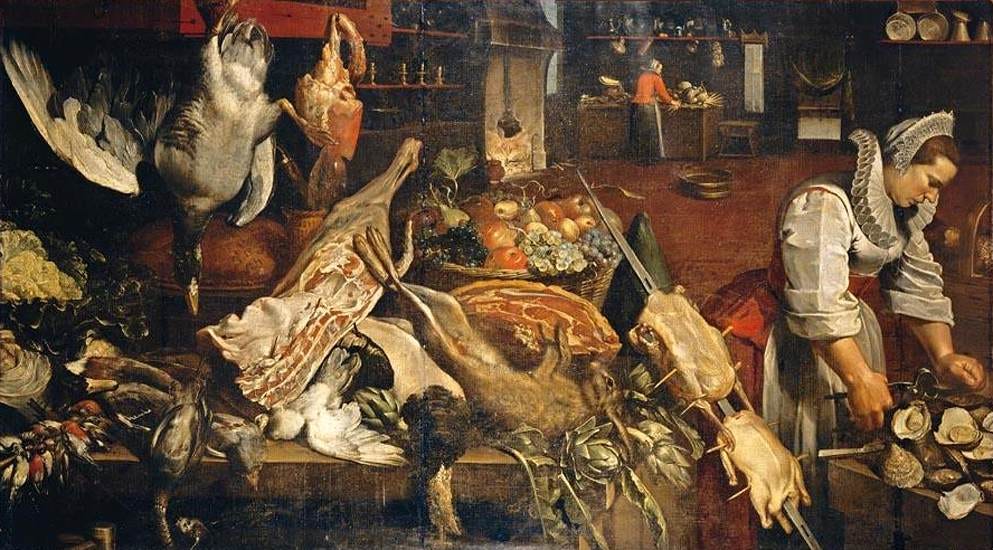Blessed Are the Wallowers
Some fragmented thoughts on beef Wellington, overthinking, guilty pleasures, tired delights, and lifting one's eyes unto the hills
Thursday, January 4
Grand Rapids, Mich.
We’re not big New Year’s people in our household. We don’t make resolutions or choose words of intention or create vision boards. In all the years that Tristan and I lived in New York, not once did either of us feel even the slightest pull toward Times Square and its hordes. And while I enjoy watching Anderson Cooper giggle—though it was better with Kathy Griffin than it is now with Andy Cohen—I like sleep more; the suggestion of staying up till midnight feels like a threat.

For New Year’s Eve dinner, though, I decided to cook something special: beef Wellington.
I’d never made beef Wellington before. It has always seemed intimidating, not least because, after absorbing so many seasons of the Great British Bake-Off, I fear puff pastry. What if I couldn’t achieve distinct layers? What if proper lamination eluded me? Then my Barefoot Contessa-loving husband reminded me that Ina Garten offers much-needed solidarity. “I always buy ready-made puff pastry,” she says. “I mean, why would you make it?”
We live in remarkable times for amateur cooks, with a relatively accessible trove of wonderful ingredients, deep knowledge, and expert advice. I turned to one of my cooking gurus, Kenji Lopez-Alt, a culinary nerd who does ridiculous amounts of testing and experimentation so that we don’t have to. He has a well-reviewed recipe for beef Wellington that gave me confidence that I might be able to pull off a respectable version, something that wouldn’t be an omen for the year to come.

Remember, I don’t believe in things like resolutions, so I certainly don’t go for omens! Yet as I was making this beef Wellington, step by careful and unfamiliar step, reading and re-reading the recipe to make sure that I understood what I needed to do, it did occur to me that the process embodied some of my ongoing hopes.
Loving labor, careful planning, and plenty of rest are worthwhile. Making beef Wellington turned out to be a lot of work. I started searing the beef and making the mushroom duxelles at 11 a.m., because everything needs time to chill. In fact, the recipe calls for multiple periods of rest.
I want to grow what I can. Lopez-Alt’s recipe specifies fresh thyme in the duxelles. So I went out to our backyard, where the thyme has survived three winters now. Especially in winter, I delighted in having something in the dish that we grew.
What I can’t grow, I want to get from the most honorable source. Our tenderloin came from Louise Earl Butcher, a whole-animal butchery not far from our house. The folks there are lovely. Every time I go in, Cyndi Esch, one of the co-owners, asks after Fozzie, who, in his more mobile days, always accompanied me on the walk to the shop. Nowadays, she never forgets to pop a pig’s ear into the bag for him.
Sometimes compromise is necessary. After being convinced that I didn’t need to make puff pastry from scratch, I couldn’t find the fancy brand of pre-made puff pastry I wanted. Whole Foods was sold out, as was another grocery store. I settled for Pepperidge Farm.
The goal isn’t sheer perfection; it’s goodness and harmony. When I pulled the beef Wellington out of the oven, I could see that my scoring had been haphazard; the thing looked like a sun-tanned burrito that had survived a slasher attack. Because I’d rolled out the pastry unevenly, some parts might have been a little underbaked. My slicing was messy. But the meat was glorious, the mustard and horseradish that I’d slathered onto it providing a welcome counterpoint to the duxelles’ earthy richness.As I thought through the lessons of making beef Wellington, though, I wondered whether I might be trying too hard to turn this cooking experiment into an object lesson. Was I overthinking it? (The answer to that question, by the way, is always yes.) Did every meal have to be served with a side dish of meaning? Why did I feel as if I needed to rationalize the pleasure?
Then I read a post from my friend Kate Bowler. “There’s nothing quite as punishing as New Year’s Eve,” she wrote. “What did I accomplish? Who still loves me?... May my fingers find the loose end of a thread that unravels everything but this truth: Love was everywhere. Enough for everyone. For me.”
Perhaps the love that went into the dish—the love that compelled me to make something tasty for my beloved Tristan—really was enough: Enough purpose. Enough meaning. It was enough.
Then I came across a thoughtful essay penned a couple of years ago by the cook and food writer Nigella Lawson, in which she rebukes the concept of food as guilty pleasure. When people speak of guilty pleasures, “they mean the food they feel they shouldn’t be eating or, indeed, the food that others feel they shouldn’t be eating,” she writes. “No one should feel guilty about what they eat, or the pleasure they get from eating; the only thing to feel guilty about (and even then I don’t recommend it) is the failure to be grateful for that pleasure.... Taking pleasure in the food we eat is an act of gratitude.”
Lawson’s delight—and mine—isn’t restricted to eating; it also embraces cooking. “It is not enough to eat food: I need to wallow in the whole process; stretch out the pleasure I get from it,” she writes. “Cooking is not just part of that process, it is full-body immersion: the rich contemplation of the beauty of the food; the feel of it in my hands; the sounds as it splutters or bubbles in the pan; the smell of it all. The more absorbed I am, the greater the rewards.”
I love how Lawson takes a word like “wallow” and reframes it, and I love how her picture of blessed wallowing—imagine the happiest of pigs, throwing its entire body around in the mud—comes with a call to multi-sensory contemplation. For me, too, the kitchen is a refuge, and such a demanding one, because it hungers for my undivided attention. It’s the rare space in which I can tell my other worries and concerns to stay outside and they actually obey. It’s the blessed place that points me toward so many forms of beauty—and that reminds me of the ever-present possibility of transformation.
Every meal is an invitation to imagine—and for someone who typically struggles to dream, that regular practice feels like a gift. What could be nourishing and tasty? What might I do with what we have in the fridge and in the pantry, as if this were our own episode of Chopped? What ingredients do I have—and by that, I mean not just the raw materials but also time and energy? The very dish that feels like mercy one day might feel like drudgery on another. Sometimes wisdom means microwaving tamales that we’d stashed in the freezer. Sometimes the good news comes to me in the form of Tristan saying, “Why don’t we just order sushi?”
Every meal is an invitation to recognize beauty—and for someone who so often fixates on what’s ugly, that regular practice feels like a grace. In his book Food for Thought, the South African philosopher Martin Versfeld lauds the divine goodness inscribed into produce. “Pumpkins, potatoes, beans, carrots, parsnip, finocchio, celeriac, chicory, tomatoes and eggplant... They are differentiated, each is itself, because they have danced out of God, each in his own clothes, to make their contribution to the convivium, where marvelous meetings take place,” he writes. I am not sure whether the marvelous meetings Versfeld describes are within the finished dishes or at the table—perhaps it’s both. Regardless, from these already lovely ingredients, he says, “A good cook creates pied beauty. Don’t eat his dish because it is necessary, or full of vitamins, or not fattening, but because it is gorgeous.”
For lunch on Tuesday, I reheated remnants of the beef Wellington and pulled some broccoli from the freezer, so that we’d have greenery on the plate. Was it all perfectly cooked? No, but it was gorgeous. Then, for dinner, we had simpler fare: white-bean soup, rich with garlic and olive oil, flecked with spinach and morsels of leftover turkey that I’d frozen after Thanksgiving. It, too, was gorgeous—and it was enough.
What I’m Reading: My friend Sarah Bessey has such a lovely essay this week in which she, too, turns to the question of what we want, what we need, what’s enough. She tells a sweet story about how, while tucking her youngest kid into bed on New Year’s Eve, she said, “See you next year!” “It’s the most-worn out joke in the world, but as she figured it out for the first time, she began to laugh. She laughed until she had hiccups, ‘See you next year…’ she kept muttering with delight, shaking her head,” Sarah writes. Sometimes even a kid’s cackle can be prophetic. “Even tired old things can bring delight, I guess…. Whatever comes this year, don’t disdain the small wanderings that bring you home to yourself eventually in these coming days.”
What I’m Listening to: The voices soar in the very first bars of “I Will Lift Up Mine Eyes Unto the Hills,” the British composer Philip Stopford’s setting of Psalm 121. I’m not sure this YouTube video has the best sound quality, but there is something special about watching the composer conduct his own piece (in cargo shorts, no less!). I offer it to you as a blessing on your day, your week, your month, your year.
What are you cooking up in your kitchen? And what’s on your hearts and minds during this first week of 2024? What can I remembering in my prayers?
Thanks, as always, for reading my ramblings. It’s meaningful beyond words to have your companionship and your care.
With all my gratitude,
Jeff







Hi Jeff,
Last night I made, for the first time, Pailin Chongchitnant’s “Chicken Wing Tom Yum Soup.” It seemed a little magical to take homely little wings, a bit of water, some fish sauce and Thai herbs and only 25 minutes, with a comforting bowl of deliciousness as the result. My husband’s eager slurps were so satisfying. It was my first time working with makrut leaves and the technique of twisting them to release their aroma felt so joyful (what can I say, I like to smell things)! I tend to overthink too, as well as get burdened by trying to “ace” things, but somehow last night, I gave myself permission to learn something new.
Happy New Year, Jeff. Thank you for how you nourish us with your words; you are a gift. Grace to you in whatever this year holds.
So many delightful things in this post, thank you. And for the Psalm 121, no puff anthem.